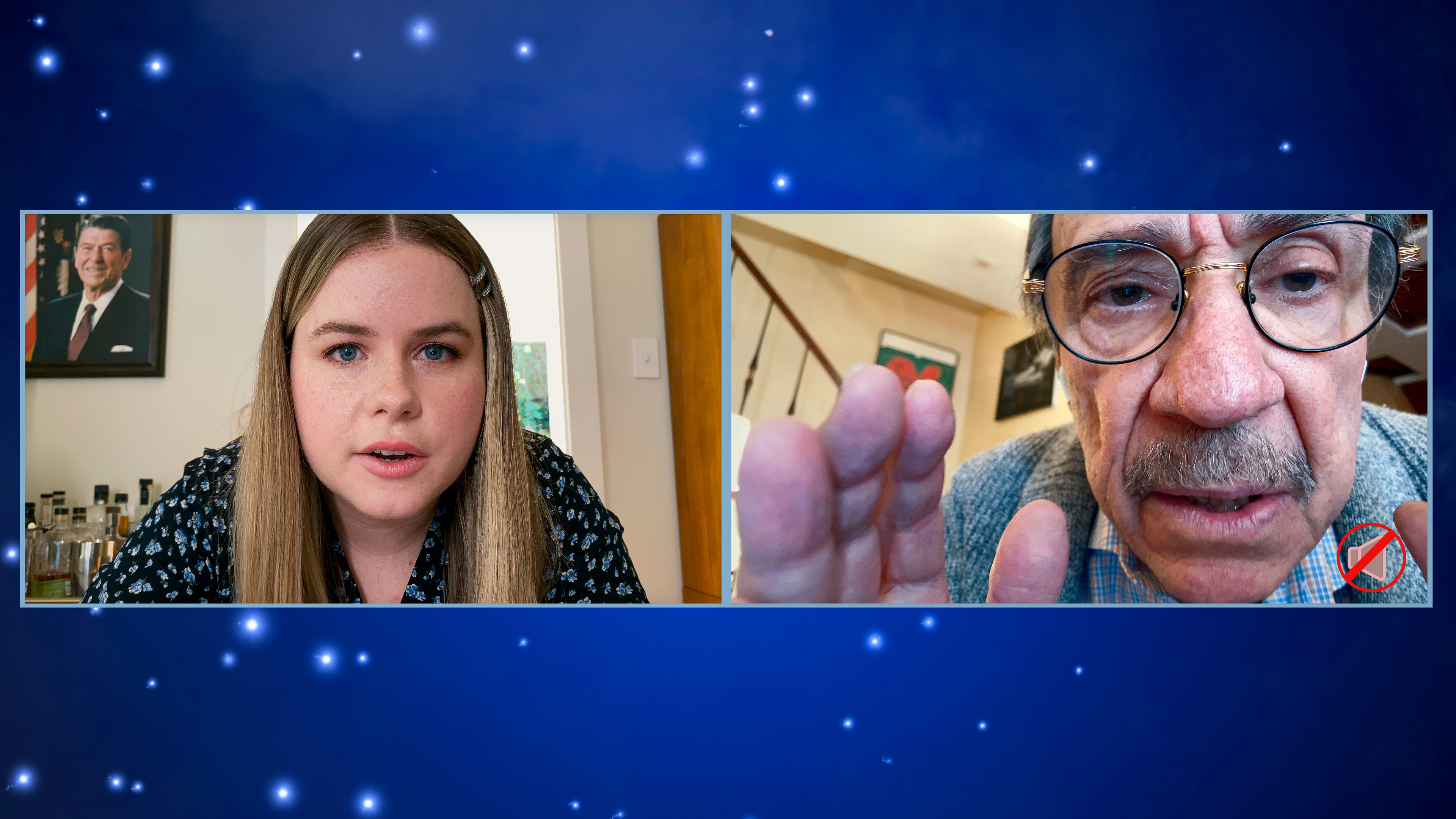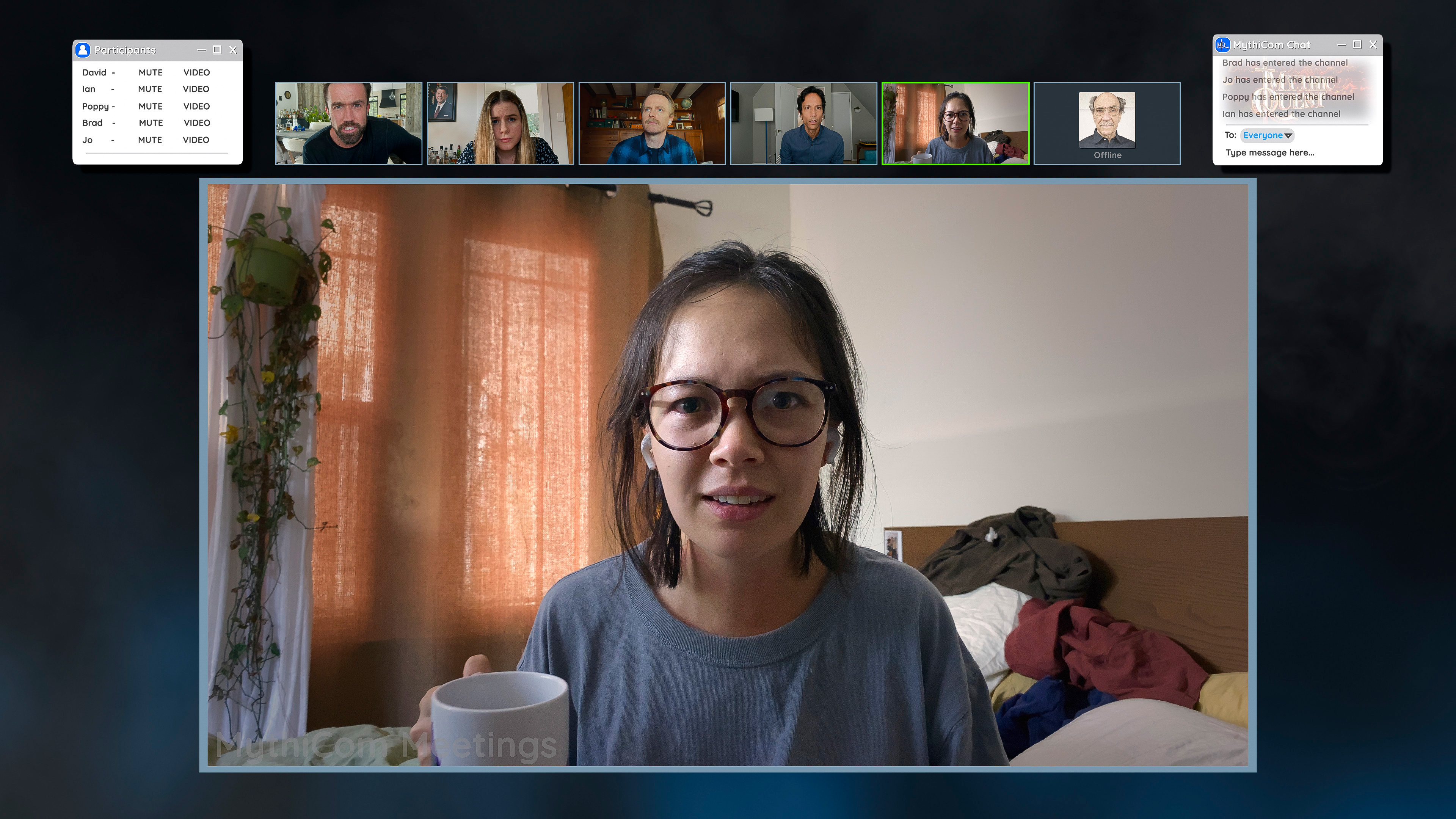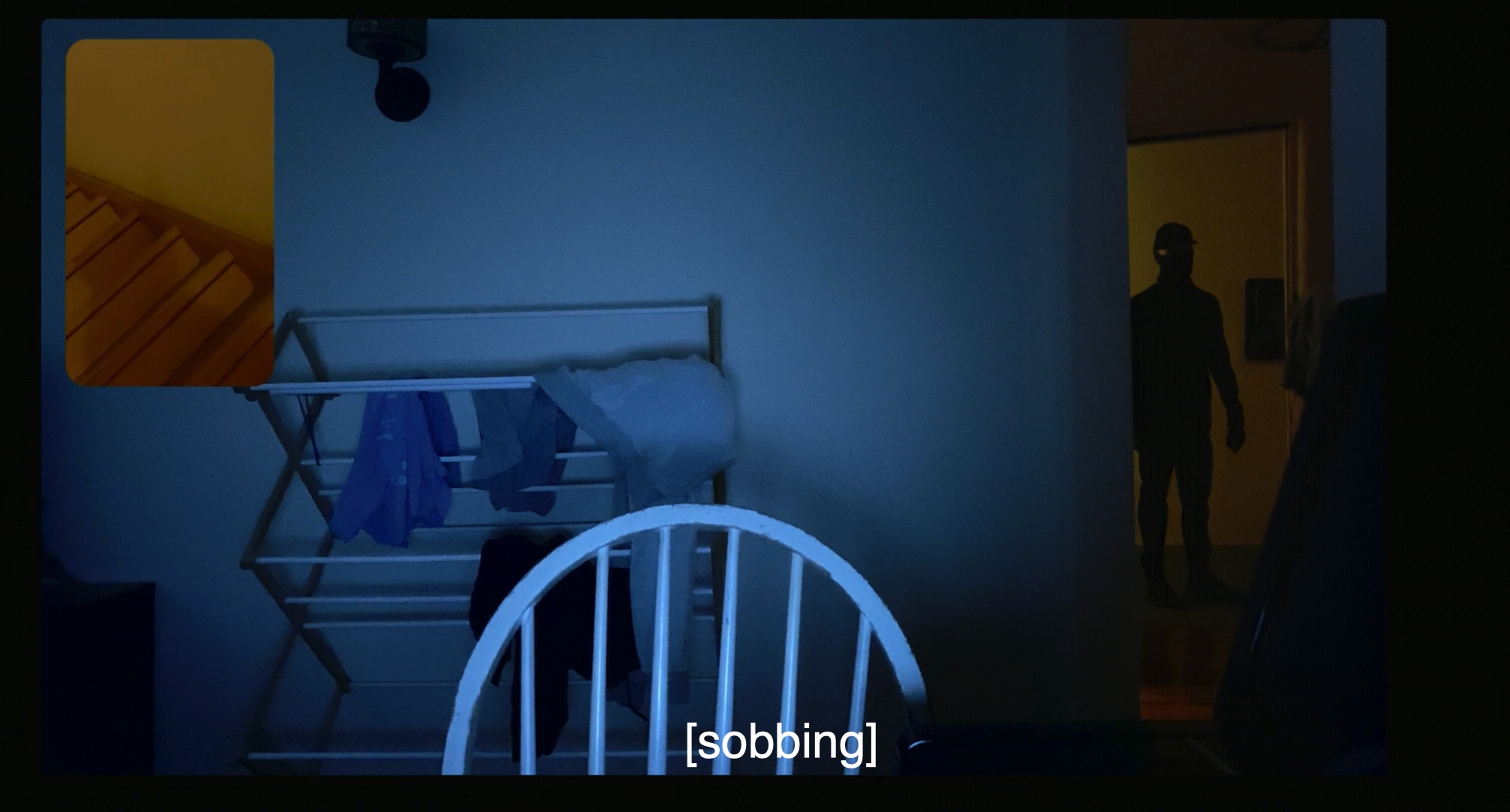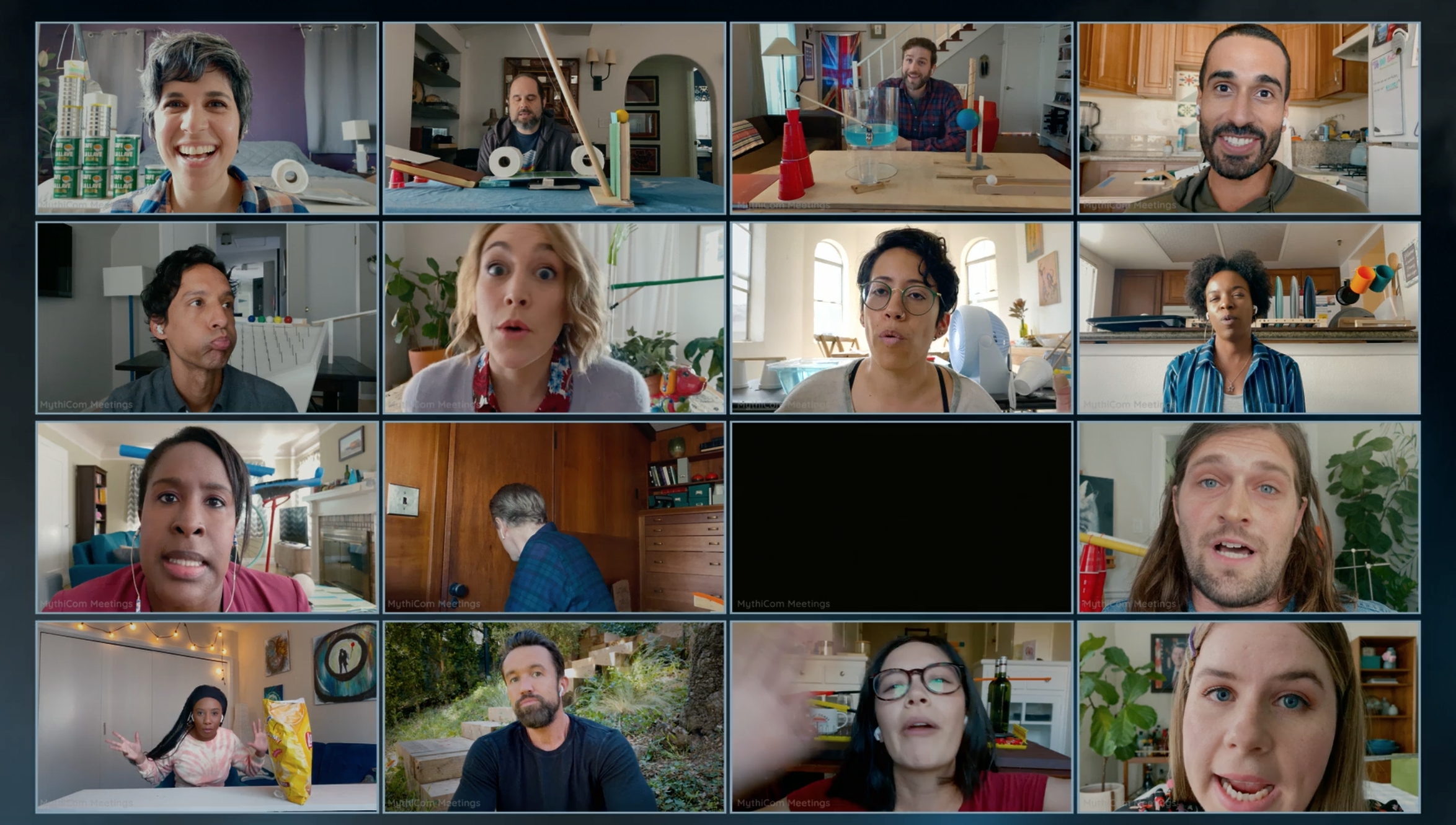Sometimes an episode of television sticks with you. It can happen for any number of reasons: the subject matter hits close to home, the timing catches you in a vulnerable moment, or the storytelling is just that good. Once in a while, things align themselves perfectly and an episode will deliver on all three of those aspects and just wallop you, leaving you staring at the screen as the credits roll, or staring at the wall or ceiling, or just, like, staring, generally, with your eyes not fixed on anything in particular as your brain overheats. This — the staring, the sticking — happened to me most recently when I watched the Mythic Quest quarantine episode.
Mythic Quest was a good show before the quarantine episode. Its first season debuted on Apple earlier this year and I binged it all in about two days. The series is set at a video game company that produces a franchise called, you guessed it, Mythic Quest, a kind of epic magical medieval game that is one part The Legend of Zelda and one part Game of Thrones. It stars — and was co-created by — It’s Always Sunny in Philadelphia star and co-creator Rob McElhenney, who plays Ian (pronounced “eye-an”), the egomaniac creative genius behind the game. The whole thing is basically a workplace comedy, but more, with silly jokes and long arcs of character growth and moments that are legitimately moving. Again, a very good show. One of the best of the year so far.
The quarantine episode took all that and leveled-up. All the characters were suddenly stuck working from home and communicating via video chat. The silly jokes were still there, in the way other shows doing pandemic specials have touched on, but the episode was also very real in a way those specials didn’t match. That’s what struck me about it. That’s why I wanted to talk to the people involved. I wanted to know more about how this little slice of powerful television came to be.
“The conception of the entire endeavor was, well, how can we get the crew working again?” McElhenney told me when we spoke by phone. The quarantine had screeched things to a halt suddenly, with no end in the foreseeable future. “I mean, it was a full stop end of day Friday, we were done. And then they hadn’t worked for a month and a half. We thought, well, if we can get everybody working and paid and focused on something for two to three weeks, that’s a win. That was really the inception of the entire thing.”
Co-creator Megan Ganz said the same thing: “I think the first and foremost reason was that we had just gone into production on the second season. We shot for one week before we had to shut down production and so the crew was furloughed and we really, really wanted to get people back to work.”
But deciding to do something and actually doing it are two different things. There are always logistical hurdles to clear and unforeseen problems to solve in a normal situation, let alone the one we’re all dealing with now, which — I don’t think I’m going out on a limb here — can safely be referred to as abnormal. It’s even more difficult when you’re trying to capture a specific moment. “We decided that if we’re going to work on anything,” Ganz explained, “we should tell the story of right now and what we’re going through currently. But we knew that story would only be relevant if we could also release the episode during quarantine, which meant that we had to do it on a very expedited timeline.”
This sounded, to me, as I attempted to comprehend it all, like an incredible hassle.
PART I: “Hassle is putting it lightly”

The quote in that heading is from McElhenney, who also directed the episode, in response to me saying the thing I said in the previous sentence. “It was a Herculean effort by a cast and crew of true professionals motivated to get it right. And to get it done in a fashion that made sure that we were presenting a premium episode of the show. All without anyone ever leaving their homes.”
This is where making a television show for a technology company comes in handy. Acquiring the equipment was not a problem. Apple had iPhones galore and the stands and brackets necessary to set them up all shipped out within 24 hours of the pitch. “All of these things were delivered to the actors,” Ganz told me. “The microphones and lighting equipment and all of that, already sanitized, and then actors then sanitized them again.” And once all the sanitizing and scrubbing was done, each actor had to position the phone in such a way that the screen was facing the Zoom camera on their laptop so McElhenney could see what everyone was doing from his own setup at home.
“The directing, actually, when I’m speaking directly to the actors, was not that difficult,” McElhenney said. “The prep in getting to those positions was really where the work was put in.”
Yes, about that.
The prep work wasn’t just nailing down the technology of it all. They also had to make the show. The actors had to act, with no one else around them, in their own homes, without the kind of assistance they have on a set. “If I had a couple of scenes to shoot in the day,” said Charlotte Nicdao, who plays Poppy, the game’s tech mastermind, “I would be on a FaceTime call to my makeup artist and my hairstylist, and they would talk me through everything, which I really needed because I was very bad at doing my hair and makeup.”
There was also the matter of finding a spot to shoot in each actor’s home, a stressful and collaborative experience in a number of ways. Think about how you present your home when you have company coming over for dinner. Now think about that company being millions of strangers watching you from their own homes. Now think about all of that and add in the fact that you — like Nicdao in the episode — are playing a character who very much does not have it together during quarantine.
“I would deliberately set things up to look kind of messy and gross,” she said. “I would feel like every time I signed on, I would want to be like, ‘I’ve made it look like this. This isn’t how I usually live.’”
My favorite story about the actors filming themselves at home involved F. Murray Abraham, the 80-year-old, Oscar-winning veteran of the stage and screen, who plays the high-minded story consultant for the game. He was enthusiastic and game for anything, Ganz assured me, but there are certain technological issues that do not transcend generations. “We had to deliver all of his equipment to New York and then, from here, over the phone, set up his whole situation to shoot himself in Zoom,” she said. “And I think the place they started with was trying to figure out what his Wi-Fi password was.”
So, yes. A hassle. But a worthwhile one.
PART II: “Hey, it’s okay to cry. It’s okay to be scared.”

The thing I liked most about this episode was the way it showed how people are struggling in different ways during quarantine. Some are finding goofy outlets for their excess energy (the characters played by Danny Pudi and David Hornsby engage in a heated online Street Fighter battle with large charitable donations and shaved eyebrows on the line), some are just trying to fill the day however they can (there’s a whole bit about passing things from one Zoom window to another that takes on added significance later), and some people are really, truly struggling. This brings us to the part where things get real. This brings us to Poppy and Ian.
Poppy and Ian are opposites in almost every way. Poppy is the hard-charging coder who was born with her foot on the gas pedal, a workaholic who dives into the minutiae of that work, taking on more and more and trying to put out the fires caused by everyone else, most notably Ian. She’d been spending quarantine neck-deep in a coding sprint to finish a huge project. Nicdao describes her character thusly: “The way I see Poppy is that she has not stopped working her whole life. I mean, she’s this supernova genius that probably skipped a bunch of grades in school and moved to the States from Australia to go to college well before she was college age. Then she went straight from that into creating this hugely successful game, which is her baby, that she wouldn’t leave alone, especially not with Ian, for a moment.”
Ian is a big idea guy. He’s great at explaining themes and rallying the troops and projecting confidence, but he is hopeless at dealing with the smaller steps it takes to get to those big ideas, and he is not particularly good at dealing with any part of the world he cannot bend and shape into his own vision through force of will. He’d been spending most of quarantine barricaded in his compound and sending “inspirational” videos to the staff. McElhenney describes Ian’s struggle in quarantine thusly: “A character like Ian, who was such a narcissistic egomaniac, would never admit that he was struggling. And in fact, he would just project this air of machismo more than anything else. And then because he’s so insufferable, he would force it upon everybody else so that he was almost like, it was so clear that what he was doing was creating this aura of confidence that everybody could kind of smell.”
The problem started when the project ended. Poppy finished coding and celebrated for about 10 seconds and then promptly fell to pieces with nothing to do, with no immediate purpose. It’s what I said earlier about her being born with her foot on the gas. Now she’s mashing the gas and brake at the same time and her engine starts to blow.
“I think for years and years,” Nicdao explains, “her entire life has been her work and her ambition and her creation. And being forced into thinking about other things, I think, would be extremely traumatic for her.”
One line, in particular, was traumatic for both Poppy and Nicdao, whose Australian accent in the show is her own: “I had a line that was like, ‘My family are thousands of miles away.’ And every time I had to say that line, I would break a little bit because it’s true.”
This all leads to one of the most powerful moments of television I’ve seen this year. Poppy crashes — tears and anxiety and hopelessness streaking across her face. Ian sees this and finds the motivation he needs to leave his compound and venture out into a world he finds very scary, filled with things he can’t control. He shows up at her door and they hug. It’s a long hug, a deeply meaningful hug, one that is not romantic at all but more of a release. It’s two flawed people — friends — who need each other, reaching out, knowing in that moment that mental health trumps quarantine for this specific situation. The camera lingers for a long time, much of the action half out of view because it’s only being recorded by Poppy’s laptop camera at her desk. For an extended period of time, it’s basically a black screen and muffled sobs.

This is the part that hit me. The way the show addressed this kind of heavy emotional aspect of our current shared experience head-on. It’s something everyone can relate to even if we don’t often discuss it openly. Nicdao put it beautifully over the phone: “It was really important that people could also see that what they were feeling was valid. I think that there’s been a lot of, ‘Be strong. Set it aside. It’ll be over soon. Don’t worry.’ I found it really comforting when people in my life have said, ‘Hey, it’s okay to cry. It’s okay to be scared. This is unprecedented.’ So I sort of saw Poppy’s storyline as being able to say that to our audience as well.” In short, it’s okay to not be okay sometimes. That’s heavy, and true, and very, very real.
I really can’t overstate how terrific Nicdao’s performance is in this scene. Especially when you add in the weird circumstances she dealt with while filming it. The person she’s hugging isn’t actually McElhenney; it’s her husband, who isn’t even an actor. McElhenney filmed his part outside his house and in his garage. The characters shared a deeply personal, emotional moment while the actors playing them remained miles apart. I feel like I’m not getting across how impressive this is. Let’s just go ahead and turn it over to McElhenney, who said all of this without a single pause when I asked him what he thought of Nicdao’s work in the scene.
We have to recognize that there’s only one person in that room and that’s her. Her husband is out in the hallway waiting. She has to operate the camera. She has to make sure all the settings are correct. She has to operate all the audio settings. She has to make sure her hair and makeup is right, right before we roll. Then she just listened to a little bit of direction and some ideas that I had from a directing standpoint. Then she has to get herself into an emotional state where it’s believable and emotionally resonant and ultimately cathartic when he comes through that door.
Then I walk out to the street and then I say, “Action,” and we begin the scene. Then I step onto my own property and I go into the garage. She then walks through the hallway. I can hear me speaking into her headphones as the character, and then both as the director and producer. The door opens, I’m now talking to her husband and her because their positioning was a little off and I was trying to get them to turn. She’s listening to me give her direction as she’s having this moment of great emotional catharsis, heaving sobs into someone’s chest who yes, is her husband, but it’s not an actor. I’m also giving him direction that she can hear because he’s positioning his body in an unnatural way. All of this is happening as she is giving one of the greatest performances that I’ve seen all year.
To put all of that into perspective, I can say that I’ve never seen an actor pull something like that off in 15 years of producing television.
Yeah, that just about says it. To pull off that scene, under those circumstances, is a borderline superpower. “By the time it was done, I didn’t feel vulnerable,” Nicdao said of the performance. “It kind of felt cathartic.” As someone who did none of the hard work setting up, filming, or performing the scene, and really just sat there in bed taking it all in, I felt the same. I’m kind of feeling it again now, just typing this. I wasn’t joking about this sticking with me.
But you don’t want to end on that moment. You want to end on a win, a triumph for everyone, possibly even, just maybe, with an aggressively complicated Rube Goldberg device that involves over a dozen Zoom windows and the theme music from the Rocky movies. That could work.
PART III: “Let’s see what happens if I just call Sly and see what he says”

My questions after watching the episode’s closing Rube Goldberg scene, which you should watch if you haven’t yet, were twofold:
- How does one set up a huge Zoom Rube Goldberg machine that features 16 people in 16 separate boxes doing something that flows from one box to the other, seamlessly, without having everyone in the same room at any point?
- How does one go about clearing the Rocky music for a television show?
The answer to the first one was as tricky as I imagined, as McElhenney explained. “I called production design, our special effects coordinator, our property department, and said, ‘Hey, we need to figure out how to do this.’ And so each individual box was discussed and then our special effects coordinator, Jonathan, then went and built each individual machine and then would send me videos of them.”
Then it was in the hands of the actors, who actually had to film the moving pieces with their phones, the only shots not lined up with a steady mounted camera. “Everything had to be sanitized and delivered it to the individual actors, who then had to set it up inside their apartments,” Ganz said. “Jessie Ennis, her part of her Rube Goldberg was 100 ping pong balls dumping on her head. And she sanitized each one individually.” And, Ganz added, there were often many, many takes. “Danny Pudi, I think, did 17 takes or something like that. He would do a take and think he got it right and then he would send the video to us, and then we would be like, ‘Oh, but actually, you can’t see it fall out of the frame, or it falls too far to the left or whatever it is. So you have to redo it.’”
Again, a hassle. But again, a good one, as Ganz clarified. “We felt as triumphant as the people did at the end of that Rube Goldberg because we also felt like we pulled off this crazy technical achievement.”
Which brings us to the music. The whole scene is set to Bill Conti’s “Going the Distance” score from the Rocky franchise, which is almost a cheat code to the heartstrings of fans of those movies and Eastern Pennsylvania boys like both McElhenney and this reporter. (I asked both McElhenney and Ganz if he demanded they use the song given his Philly ties. Ganz: “Yes, that was all Rob.” McElhenney: “First of all, I didn’t demand it. I suggested it.”)
The song works perfectly. The bells ding, the swells swell, it sucks you in and gets you invested in anything you set it to. It should be used in everything. There’s a good reason it isn’t, though: Clearing the rights to the music is notoriously hard. So, again, how?
The key here is that McElhenney had cleared the music once before, for the Super Bowl episode of Always Sunny. I was not fully prepared for how that happened when Ganz told me.
“In order to clear it for that episode,” she said, “he called Sylvester Stallone. He called him directly.”
Excuse me? He just called Sylvester Stallone to get permission to use the Rocky music? I asked McElhenney about this later, in part to get confirmation and in part because I had to know more.
“MGM, who owns it, was very nervous about it,” he said. “And they essentially just defer to Sly on those matters and say, ‘Look, this is something that we feel very protective of,’ which they should, ‘and this is a part of our brand.’ And so they actually denied our usage for Sunny. I just figured, well, I don’t know, let’s see what happens if I just call Sly and see what he says. I reached out and he said he was a fan of the show. I don’t know if that was true or not, but he seemed to be really open to what we were going for and he approved it. So we used it in Sunny and the same thing happened with this.”
So that answers the question about clearing the Rocky music. You just call Sylvester Stallone and ask him. Easy peasy.
(I’ll tell you this: I do try to be professional. I try to have follow-up questions locked and loaded when I talk to very busy people. I try to make it appear as though I know what I’m doing as often as possible. I did not have a follow-up to “so I called Sly directly and he said yes.” I’m still wrapping my head around it, to be honest. I listened to the audio of our conversation again when I was putting this together and my entire response in the moment was “That is… cool.” Very professional. Very good.)
The combination of the Rube Goldberg machine and the dramatic emphasis added by the Rocky music gave the episode the triumphant, victorious ending it needed after taking the audience on that emotional rollercoaster. I did not ever expect a Rube Goldberg device to make me cry. And yet, there I was, staring with misty eyes at nothing in particular as the credits started to roll. It put a perfect uplifting bow on an episode that was powerful and emotional and captured a moment I think all of us are feeling right now in one way or another. I laughed and cried and felt understood all in 30 minutes. You can’t ask for much more than that out of an episode of television. Or any piece of art, really.
I think Nicdao put it best when I asked her to sum up the experience: “There was a sense of almost like guerrilla filmmaking in the way that we did it. We were constantly problem solving and experimenting to figure out how to do something. So it really did feel like, whenever we got it right… it felt like a really big celebration and achievement.”
Achievement is accurate, but probably an understatement. To make an episode of television this good under these circumstances is almost a miracle. I think that’s one of the reasons it stuck with me in the first place. It’s definitely one of the reasons it’s still sticking with me now. I don’t see it going away any time soon, either.







